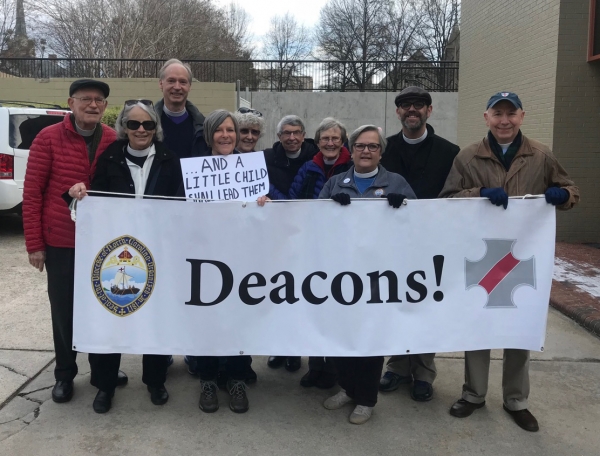Deacon Reflection: We Are All in This Together

By The Venerable William Joyner
In the 1970s TV movie Queen of the Stardust Ballroom, the postal worker portrayed by actor Charles Durning says to his love interest, “A mailman is what I do, it’s not who I am.” A deacon is who I am, and for deacons, the continual challenge is to understand this and convey it to others. The Rt. Rev. Richard Grein, the bishop who ordained me in 1992, taught us all what it meant to be a deacon, not just to do diaconal things. An old statement from the North American Association for the Diaconate summarizes this pretty well: “A deacon is a baptized person called and empowered by God and the Christian community to be an icon illuminating Christ as a model of servanthood for all people. The deacon fulfills this calling through action and example as servant leader, witness, intercessor, facilitator, visionary, nurturer and interpreter among diverse people. The deacon is messenger and proclaimer of Christ’s presence among us.”
At ordination, the bishop says to the deacon, “Fill him with grace and power and make him a deacon in your church.” The same line is used for priests, and the joke is always that deacons get a much heavier dose of grace than power. Deacons are always asked, “When are you going to be fully ordained?” and “What does this mean you can do?” Part of both the frustration and joy in being a deacon is that there is really nothing you can do by virtue of ordination that any baptized person cannot do. True, deacons have special roles set aside: to proclaim the gospel, to dismiss the people, to receive and prepare the gifts, to minister to the sick. A hard to explain and yet wonderful thing about the diaconal role is that it doesn’t matter if you are ordained to do it. If the gospel is read, the people are taught; if communion is distributed, they are fed; if they are dismissed, they are sent into the world in witness and service. There is no question of validity or whether you have the power to do it – it is done, with God’s grace and blessing.
At the Chapel of the Cross, Chapel Hill, we held a monthly Special Worship service to which all were welcomed, but to which people with developmental delays and disabilities were especially invited. This still happens on the third Monday of every month. Every so often there would be a story in the press about this, and the invariable question was, “Are these people here part of your congregation?” My answer was always the same – they are part of our congregation, they are part of our parish, they are part of our worshipping community because they are here, because they come, and we come, to pray and sing and celebrate our life together as God’s children.
Like many other aspects of a deacon’s ministry, it is hard to differentiate this Special Worship. Is it outreach? Is it liturgy? But that is what makes it so special, and really so diaconal. The boundary between the Church and the world, as the Rt. Rev. Gary Gloster used to say, is always moving. It has to be. What this helps me to remember, and what it helps all who participate in ministries in our congregations to remember, is that we are all in this together. In prisons, in hospitals, on mission trips, we are not there to do “for” others whom we sometimes try to distance by calling them the “less fortunate.” And we are not doing this because we are deacons or even (though it is our baptismal promise) because we are Christians. We are there because we are all God’s children, made in God’s image. We are all in this together.
Tags: Deacon Reflections / Discernment
